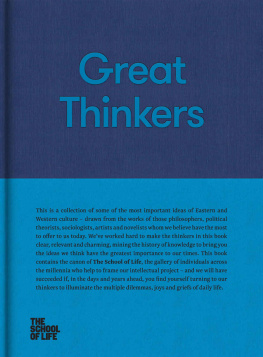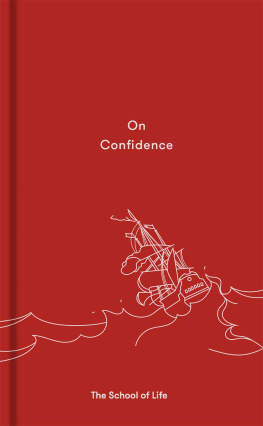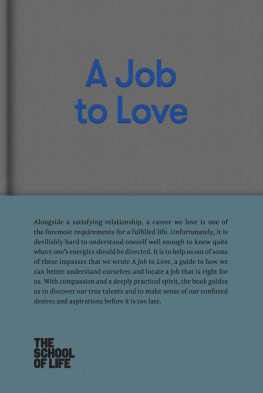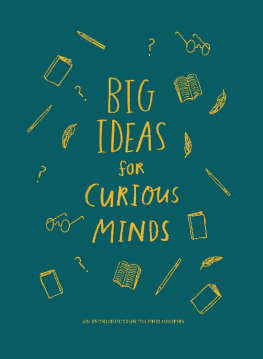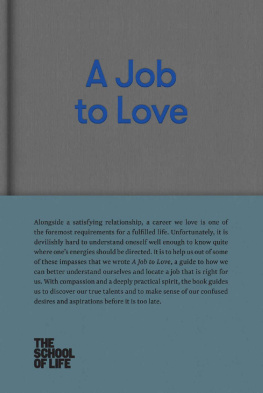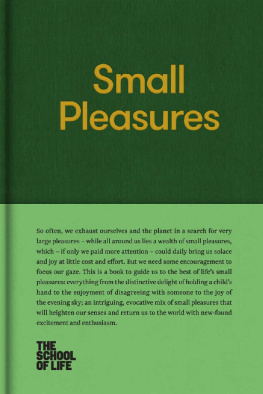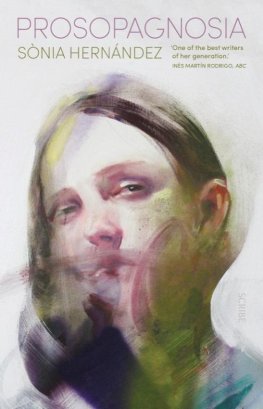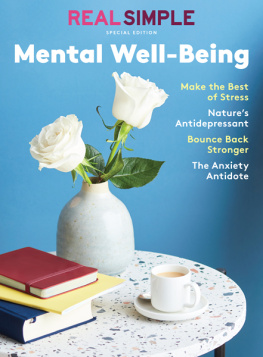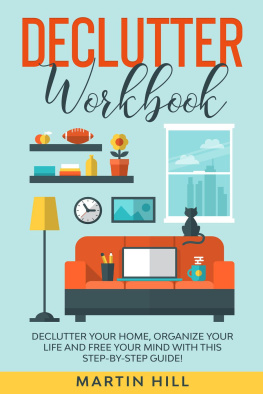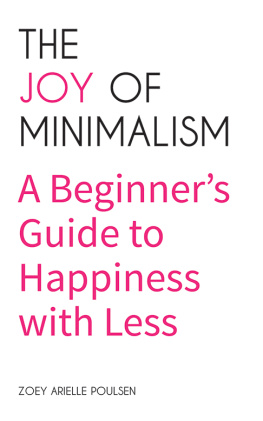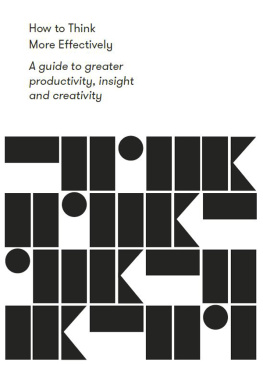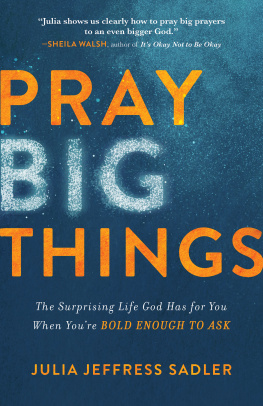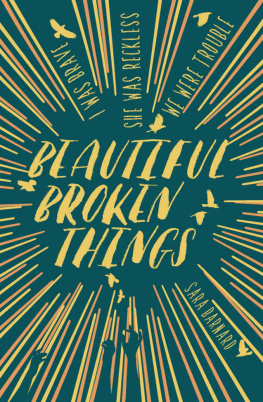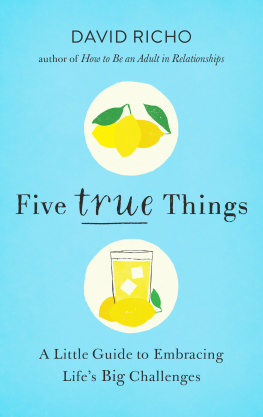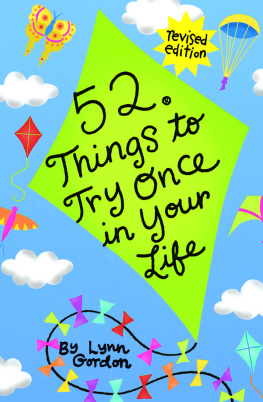A More Exciting Life
A More Exciting Life
A guide to greater freedom,
spontaneity and enjoyment
The School of Life
Published in 2020 by The School of Life
First published in the USA in 2021
70 Marchmont Street, London WC1N 1AB
Copyright The School of Life 2020
Designed and typeset by Dan Cottrell Studio
Printed in Latvia by Livonia
All rights reserved. This book is sold subject to the condition that it shall not be resold, lent, hired out or otherwise circulated without express prior consent of the publisher.
A proportion of this book has appeared online at www.theschooloflife.com/thebookoflife
Every effort has been made to contact the copyright holders of the material reproduced in this book. If any have been inadvertently overlooked, the publisher will be pleased to make restitution at the earliest opportunity.
The School of Life is a resource for helping us understand ourselves, for improving our relationships, our careers and our social lives as well as for helping us find calm and get more out of our leisure hours. We do this through creating films, workshops, books and gifts.
www.theschooloflife.com
ISBN 978-1-912891-66-5
10 9 8 7 6 5 4 3 2 1
Introduction
Some of what may be subtly yet importantly wrong with our lives can be traced back to the lack of a quality that could sound a little nave or even unserious, but that is critically important to our flourishing: excitement.
When we lack excitement, it isnt that things are terrible: we may have work, friends, family and some options. It is just that, in a multitude of areas, life lacks flavour. Things feel repetitive, routine and devoid of intensity, as though we are merely going through the motions; as though we are there but are not properly present. Not much profoundly satisfies us; we fulfil obligations, we are dutiful and responsible, yet our deep selves are unquenched. Without meaning anything melodramatic by this, we are in a sort of cage. Or, to use another metaphor, were crouching; our limbs arent free. We are drained by varieties of shyness, numbness and inhibition.
Typically, we are invited to address the absence of excitement with outward manoeuvres: we are encouraged to travel, parachute out of aeroplanes or learn a foreign language. This is a book of psychology, however, and it holds that a lack of a sense of excitement primarily comes down to aspects of our minds in particular, to difficulties we have first identifying and then feeling legitimate around our own desires and aspirations. Somewhere along the path of our development, we resigned ourselves too early to things that deserve to be protested against; we have felt too constricted (and perhaps unloved and unloveable) to communicate our truth to others; the proper expansion of our characters has been sacrificed for the sake of a now-stifling compliance.
This is a guide to recovering some of our spirit, and to becoming the sort of people who, thanks to a range of psychological reorientations, are connected to the intensity, beauty and mystery of life and to the richness of their own possibilities. The English psychoanalyst Donald Winnicott (18961971) once remarked that what mattered less than whether someone was happy or not was whether they felt as if they were leading their own lives. This suggests how often we fall into leading the lives that other people (some of them well-meaning) want us to lead, adjusting ourselves to their needs more than is wise and bowing to socially sanctioned but incomplete ideas of what is normal.
This is a book about freedom. We know the word in its political context, but it exists, and achieves its full resonance and majesty, in a psychological form. An exciting life of freedom is different from a merely good or wise or calm life: it is one that can feature novelty, tension, eros, ambition and appreciation. It encompasses a capacity to take risks, to trust and to know how to communicate ones perspective to others. It means allowing oneself to be a little more forthright, joyful, irreverent and unfrightened. This is a book for people who, although living, are only intermittently liberated enough to feel alive, but who are now ready to make meaningful changes.
Contents
1
Others
Learning to lie less often
Our image of liars is so negative, our sense of their motives so dark, our presumption of their primal sinfulness so unyielding, it is no wonder that we generally deny the possibility that we might be liars ourselves.
However, it would be much more honest, and more liberating, to accept that we spend a lot of our lives lying in one way or another, and to grow sympathetic to and curious about the reasons why we do. We tend to focus on the delinquent or semi-criminal aspects of lying as though deceitfulness always happens in relation to a schoolteacher, an angry father, a gang or the police and so miss out on its more subtle, everyday psychological varieties in which we, the law-abiding, careful, ostensibly moral majority, are enmeshed.
Despite our disavowals, we are continually lying about some of the following:
Hurts
We lie about the many almost imperceptible hurts that others have inflicted on us but that we lack the vocabulary and the confidence to complain about cleanly. We lie about a range of minor resentments that have made us bitter and irritable and have choked our capacity for warmth and spontaneity. We lie about the number of other humans we are in a (quiet) sulk with.
Guilt
We lie about how sorry we are about certain things weve done, and about how much we long to check in with certain people and apologise, if only we knew that they would greet our confession with a measure of forgiveness.
Tenderness
We lie about how moved we are by many things that busy grown-ups arent supposed to care too much about: a parent and child walking together hand in hand; the sky at dusk; the face of a stranger in the street; a bad film with a happy ending; a picture of our family decades ago in better times. We disguise the fact that beneath an often confident, brusque adult exterior is a pensive, weepy child.
Anxiety
We lie about how alarming it is to be alive; how frightened we are of the responsibilities we carry; how unsure we are of our path; and how little we understand even at our moments of ostensible authority and competence. In certain moods we might long to utter a despairing I dont know at much that comes our way.
Sexuality
We lie about a majority of things that turn us on and about many that really dont but apparently should. We lie about the sensual details that we rehearse in our minds alone late at night and the unfaithful dreams that coexist alongside our public commitments.
Pleasure
We pretend to be having fun skiing and in nightclubs, at the theatre and reading the long novel that won a very important prize. We pretend to love our friends. We lie about how bored we are. We strive not to admit to what we really do like: staying in; eating strange things in a disgusting way alone in the kitchen late at night; plotting revenge; seeing no one; wasting time; buying gadgets; and looking up the fate of ex-lovers and colleagues from long ago.
In the process, without meaning to, we perpetuate a world in which everyone else has to lie along with us. Because everyone refrains from uttering their truths, the price of breaking cover remains impossibly high. We collude in a mass conspiracy to suggest that love, sex, work, family life, friends and holidays unfold in a way we know in our hearts they simply dont. We remain at the dawn of any collective capacity to acknowledge what fundamental parts of life are actually like.
Next page

